
14 tools for dealing with Depression
 NOTE: There are a few links to things you can purchase in this article, but I don’t make any profit if you click those links or buy those products. These are things I use and find useful, and I don’t profit or benefit in any way if you buy them or use them.
NOTE: There are a few links to things you can purchase in this article, but I don’t make any profit if you click those links or buy those products. These are things I use and find useful, and I don’t profit or benefit in any way if you buy them or use them.
I was diagnosed with Clinical Depression about 10 years ago; these are some of the tools I use to make living with mental illness a strength rather than a liability. There are fourteen things on this list, most of them cheap or free; you don’t have to do all of them. Just pick one or two, and start trying to do them regularly. Every small effort that you make will help push back the dark; over years, you can build up habits that will make you resilient in the face of setbacks, and make you stronger than you dream that you can be.
I believe that these tools are really helpful for most people, but in particular for people dealing with Depression, Anxiety, and substance addiction. Neuroplasticity is one of the miracles of humanity – it’s not only true that your brain can change, but that it does change, and that you can – to a certain point – rewire it to work better for you.
However, I am not a Doctor; I’ve got a BA in English Lit. You should see a doctor about the things you’re experiencing.
If you’re thinking about self-harm, please call a crisis line right now; the world needs you alive, healthy, and safe. Please believe me; we need you.
That being said, if you are not in immediate crisis and are talking to a doctor, here are some tools that might be useful for living with your illness:
1. Take an Omega Fatty Acid supplement every day
I initially took medication for Depression, but once my student health insurance ran out, I couldn’t afford it anymore, so I did some research and started taking Omega Fatty Acids instead. Medication can be a very effective tool for some people, but for me, this daily supplement was much more effective (in combination with other work that I did to get better). It helped me heal myself of the feeling of heartbreaking, gasping loneliness that had dogged me since I was a kid. ((I know that sounds kind-of melodramatic, but any other explanation that I can think of is even more so. It’s a distinct feeling and unless you’ve had it, there’s no good way to describe it.)) There are plenty of good supplements out there, but be sure to check to see if it’s contra-indicated with any other medications you’re taking.
 2. Walk for 30 minutes as often as you can (preferably every day)
2. Walk for 30 minutes as often as you can (preferably every day)
Studies have shown that exercise is the most useful treatment for a host of mental health issues, including Anxiety and Depression. But you don’t have to join a gym or start running marathons or buy anything – just go for a walk. Then go for another one, and another. Try to incorporate it into your day – park further away from your destinations, or get off of the streetcar a few stops earlier than usual on your way home. You don’t have to do 30 minutes all at once, either – you can break it up into three 10-minute walks. If you can walk in a green space, like a park, that will help even more. And if you’re not able to walk, talk to someone about gentle, simple exercises that you can do for 30 minutes a day – Chair Yoga might be a good option, and a Youtube search brings up lots of videos.
3. If the sun is shining, go outside for 20-30 minutes; no excuses!
Seriously, the Vitamin D that you absorb from the sunlight will do you so much good – put on some pants, go outside, and make sure you let your face and head directly absorb as much of that beautiful sunshine as possible. In the Winter months, this is especially important. Even better, combine it with a walk!
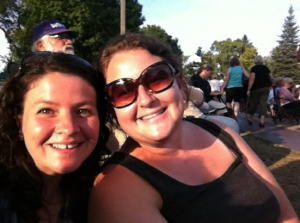 4. Get out and see people, preferably happy people
4. Get out and see people, preferably happy people
Social interaction is a major part of overcoming depression and anxiety; try to go out with friends frequently, even if you don’t feel like it. I know that some of you are thinking something like ‘I don’t really have any friends,’ and I recognize that; sometimes you don’t have people to turn to, or the people that you do have in your life are not good people. If you are in an abusive relationship, you may be cut off from friends and family, and if you have an addiction, your friends may be addicts or enablers. In those situations, try joining a class, volunteering, or looking for therapy groups in your area. Good places to start are libraries, religious organizations, local music or arts festivals – if they don’t have any volunteer opportunities or workshops available, they’ll know somewhere that does.
 5. Listen to the way you think and speak to yourself; try to stop negative, critical thoughts and replace them with supportive, positive thoughts – even if you don’t believe them
5. Listen to the way you think and speak to yourself; try to stop negative, critical thoughts and replace them with supportive, positive thoughts – even if you don’t believe them
While you’ve been reading this list, how was your inner voice responding? Did it say “Well, you can’t do that, because you’re too out-of-shape for exercise. You’re too old to change. You’re too stupid to learn. You can’t afford to take a class. You don’t have time to do that. You’ll never be able to do that every day…” I’ve got that devil in my ear, too. I try taking those negative thoughts and turning them around; it takes a long time to re-write your internal script, and it’s easy to slide back, but just try catching those thoughts and replacing them with neutral or positive ones. “I can try walking at least once. I can try learning something new and it’s okay if I’m not good at it. I can try to make this a habit. I will do this every day. I will be awesome at this.” Your inner critic is going to keep attacking you, and will probably intensify when you start saying positive or neutral things. But the more often you catch and replace those mean things, the less power they’ll have, and eventually they’ll slow down or stop. I still have to catch myself, but I’m so much better than I was, and I’m happier and more successful because of it. Be kind to yourself; be as kind to yourself as you would be to someone else who was suffering (whether you think you deserve kindness or not).
 6. Eat fresh vegetables or fruit at least once a day
6. Eat fresh vegetables or fruit at least once a day
Chances are that, if you’re dealing with a mental health issue, you’re eating a lot of takeout or convenience food, like microwavable dinners, junk food, or pre-packaged snacks. I know that it’s hard to motivate yourself to cook, and sometimes it’s just impossible to find the time, but your body and mind need variety in your diet. If your overall physical health isn’t good, your mental health will suffer too, and one good way to improve your physical health is to eat fresh, unprocessed food. Grab one of those bags of baby carrots and some hummus, or something similar, for an afternoon snack. Buy a bag of apples and keep them at work to eat on the way home. Eat at least one fresh thing every day. It will help.
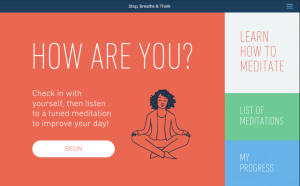 7. Meditate with this free app – Breathe – http://stopbreathethink.org/ – or pray
7. Meditate with this free app – Breathe – http://stopbreathethink.org/ – or pray
I don’t know anything about meditation, really, so this app is really helpful. Very short, guided meditations that focus on the kinds of things that really help with mental health issues, like gratitude and kindness. Most are five to ten minutes, and they don’t ask you to do anything but breathe and think about a topic. If meditation is something that your religion doesn’t support, try praying – but don’t pray for yourself; pray for peace, for compassion for other people, for healing for the world. Meditation and prayer are good ways to slow down and see yourself as a part of the whole, of the world, and help with most mental health issues as well as regular stress, sadness, etc.
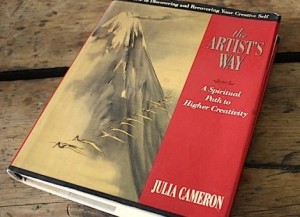 8. Use the exercises in The Artist’s Way
8. Use the exercises in The Artist’s Way
I’ve started The Artist’s Way about 20 times, and maybe I’ve completed it once or twice, but even though it’s long (12 weeks) and sometimes irritating, corny, and infuriating, it’s also incredibly useful. Whether you’re an artist or not, whether or not you’re a blocked artist, the tools and tasks in this book are practical and good. Even if sometimes it’s so annoying that you have to throw the book across the room. I’ll note, however, that it’s absolutely useless to just read the book – you have to actually do the exercises. In fact, I’d say that you can skip the chapters if you really want to, and just do the exercises (do read the intro, though, as it sets up some important things).
 9. Keep a private, hand-written journal
9. Keep a private, hand-written journal
Get a notebook and a pen and write a few pages. You don’t have to have an agenda or a point; you aren’t recording your life for posterity. You aren’t writing an article for the New York Times. You’re getting your thoughts out of your head and onto the page. That’s all. Don’t show anyone, don’t edit it, don’t re-read it. Just write it and leave it. I try to write everyday, but more often manage it a couple of times a week. I buy myself really nice pens and really nice journals, because I’m the kind of person who likes those sorts of things and I can afford it, but you don’t have to do that – go to the dollar store, buy a notebook, and write. You can burn it or shred it or throw it away or whatever when it’s done; just write in it as often as you can. This is an exercise that’s recommended in The Artist’s Way (they call it the Morning Pages), but it’s not original to that program.
 10. Try EFT Tapping – maybe it’s bullshit, but it’s free, quick, and non-invasive
10. Try EFT Tapping – maybe it’s bullshit, but it’s free, quick, and non-invasive
Okay, I can hear you thinking ‘Candace, what is this pseudo-scientific nonsense?!’ but it’s quick, free, easy, and non-invasive, so even if it is bullshit, there’s not much harm in it. I found it helpful, so I’m recommending it. I first heard about it through Gala Darling, whose article and short video on the subject is here. I will not endorse Gala’s classes or books, nor am I certain that EFT can ‘cure’ eating disorders or asthma, but I found it effective for dealing with ideas and emotions.
I’ll note that, even if the little tapping routine does nothing at all, sometimes identifying your problems by name is a very powerful tool to overcoming them. It’s not magic; it’s just a way to manipulate your brain into recognizing where the problems are and beginning to deal with them.
 11. Use a light therapy lamp in the Winter months – October through March
11. Use a light therapy lamp in the Winter months – October through March
I finally bit the bullet and shelled out for a light therapy lamp three years ago; they aren’t cheap, and I think the science is still a bit ambiguous about them. But this Winter, I forgot to use mine, and by February I was feeling pretty cruddy and was starting to say some pretty mean things to myself. So I plugged it in again and it’s been a big help. While before I might have said that I wasn’t sure if it had done me any good, now I know that it does. The one I bought is a Phillips GoLite. If you can afford it, I think it’s a worthwhile investment.
 12. Note your symptoms and go to a doctor with them; sometimes what seems like Depression, Anxiety, aging, etc. can actually be a vitamin deficiency or other condition
12. Note your symptoms and go to a doctor with them; sometimes what seems like Depression, Anxiety, aging, etc. can actually be a vitamin deficiency or other condition
For ages I’ve had serious bouts of tiredness and fuzzy-mindedness, sometimes lasting months, and I figured it either had to do with my Depression or with getting older. Eventually, I went to the doctor, and she tested my blood and found that I had a serious B12 deficiency. Since getting my B12 back up to normal levels, my whole life has improved dramatically. But it took me a decade before I went to a doctor and was taken seriously – I’d mentioned symptoms in the past to other doctors, and had my concerns brushed off. So it pays to be a good advocate for yourself – write things down, visit more than one doctor if need be, and if you’re a woman or a racialized person in particular, don’t let them tell you that it’s nothing. Symptoms come from somewhere, and you know what’s feels right or wrong in your own body.
13. Try Controlled/Coherent Breathing
I’ve read a few different variations, but essentially it’s this: take a deep breath, counting to three then exhale slowly to a count of three. Pause, then take another deep breath and repeat. It’s something you can do anywhere (I mean, you’re already breathing anyway), and it’s been shown to reduce stress, anxiety, and Depression.
Personally, I find it doesn’t really matter whether you’re counting to three or five or whatever, so long as you keep the pace even, calm, and regular. You can read a New York Times articles about it here, which has some other techniques too but tends to be a bit rules-y for me – you don’t need to lie down to do this technique, you can do it at your desk, on the bus, in a bathroom stall, in a meeting. And I think the last thing you need when you’ve got Anxiety/Depression/Stress going on is obstacles that will stop you from dealing with it when it’s happening – my workplace would be an awkward one to lie down and practice breathing exercises in, as I’m sure yours would be too. So just ignore that bit – try this technique wherever you happen to be experiencing issues. I find now that I don’t even think about it – it’s just become a habit, whenever something happens that’s upsetting or stressful, I start doing controlled breathing.
14. And lastly: have hope!
I’ve had Clinical Depression since I was a pre-teen; I was diagnosed in my mid-twenties. For more than ten years I’ve been learning to live with it. At first, I desperately wanted the doctor to just find the place in my brain where Depression lived and cut it out; I felt despair at the idea that it was incurable. But now, the condition I used to consider a liability is something I have found to be my greatest strength. It forced me to really examine my life, the things I do, the habits I have, with a view to whether or not they were supporting my overall happiness and goals, and also to strive to change for the better.
If you met me today, you’d probably describe me as a happy person, and I am. I am also a person with Clinical Depression. The two things are not mutually exclusive. And I am not special: your brain works differently than mine, but you can use these tools to get better – just take small steps, and push back the dark inch by inch until it becomes habit.
We need you, and we want to see you happier!
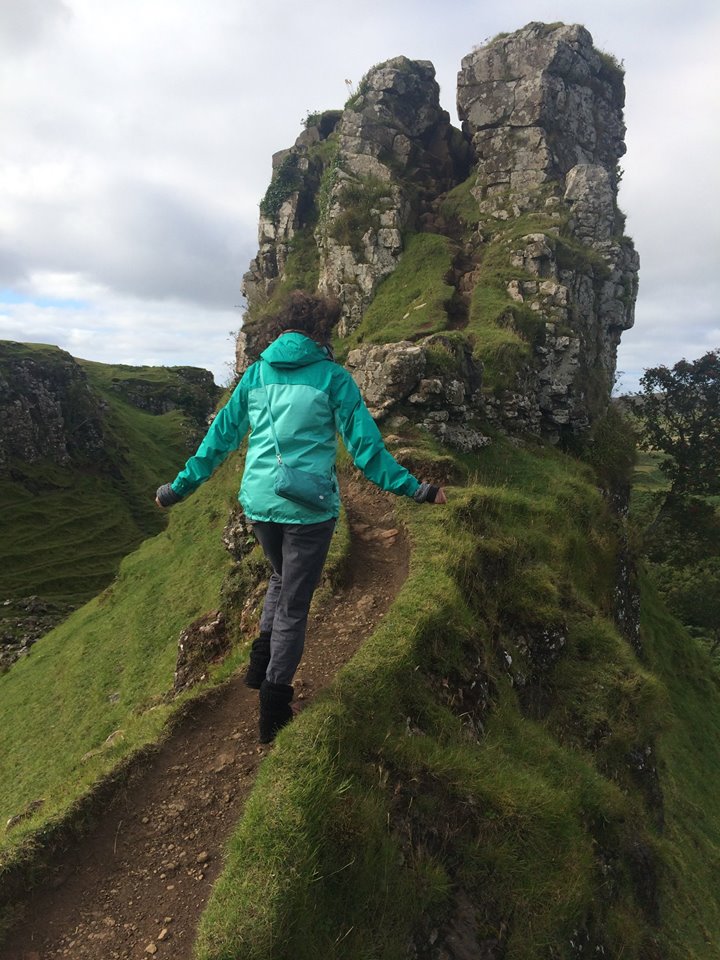

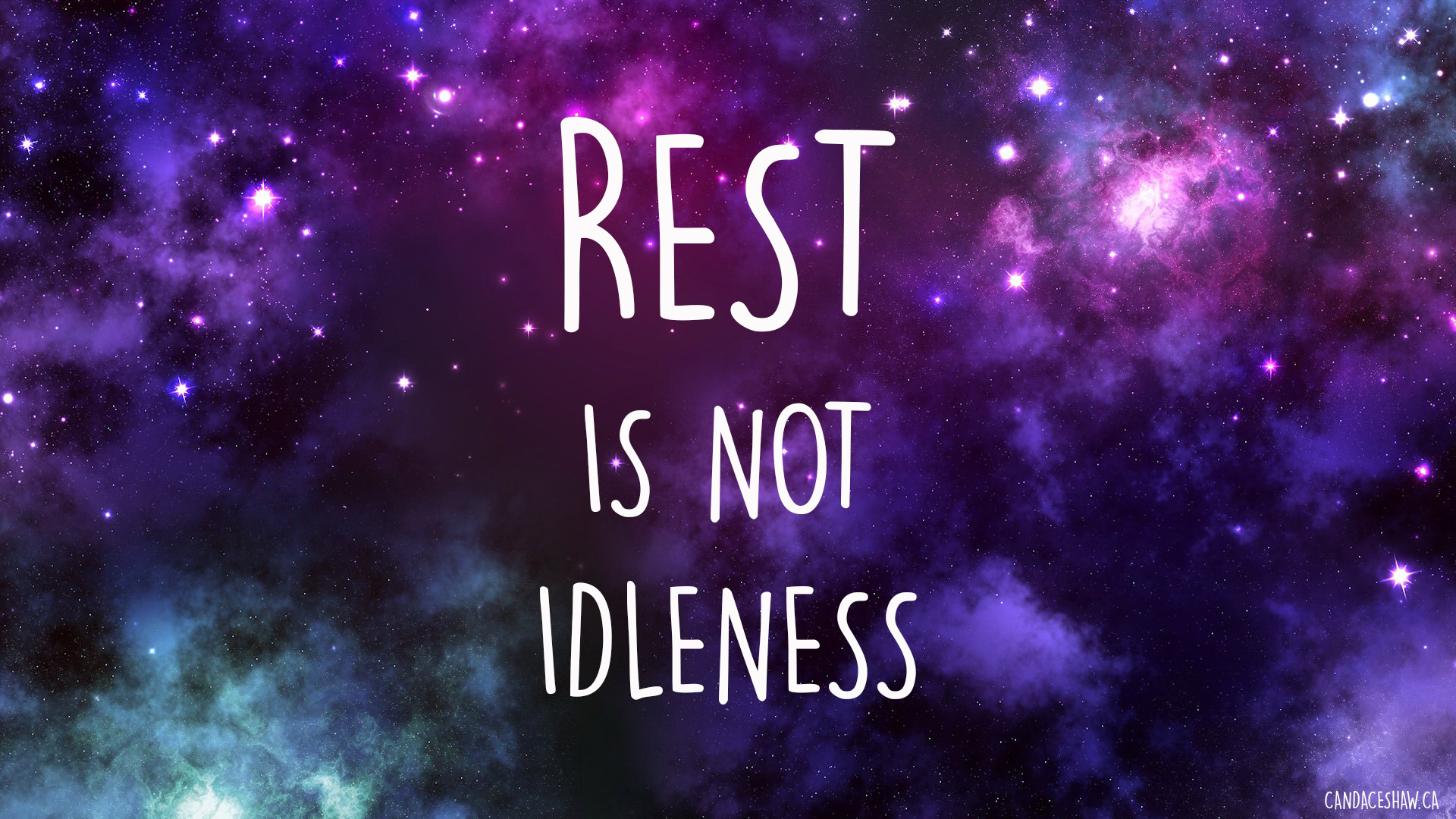
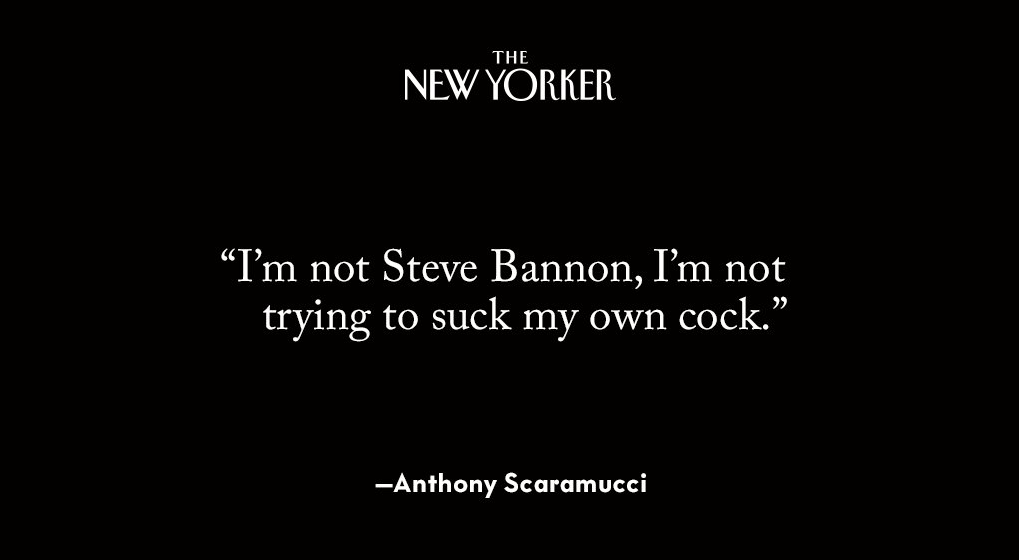
3 Comments
FelisD
#10. EFT Tapping sounds like a form of CBT (Controlled Behavioural Therapy), which is basically a form of psychotherapy which can help you retrain your brain from thinking in certain patterns. There are tons of books and workbooks out there about CBT, and can also be done in sessions with a trained therapist. So it’s probably not as pseudo-scientific as it sounds.
Candace
Hey, thank you for telling me that – I thought that there might be something to it, because I did find it super-helpful, but wasn’t sure.
Diana
This is one of the most succinct lists I have seen. For me it is walking and I am lucky enough to live in an area of Toronto so I have access to High Park, the Humber and along the lake. Also, MUSIC . Lots of venues and many types of music in our city. Last week i did five days in a row of music…three U of T student opera performances (two of them free!), Donegal fiddlers in Norwood, and the incomparable Celtic fiddler Sandy Macintyre at a Toronto pub. Walking and music reset my brain…it is like a switch going on…and I get out of my funk and my need to lie on the couch and watch bad TV!